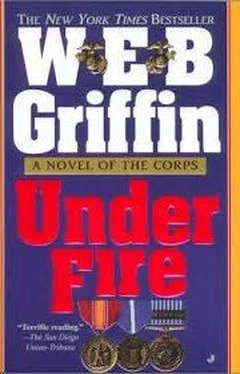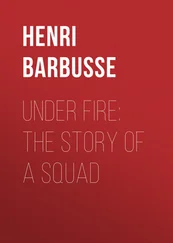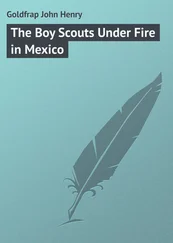Griffin W.E.B. - The Corps 09 - Under Fire
Здесь есть возможность читать онлайн «Griffin W.E.B. - The Corps 09 - Under Fire» весь текст электронной книги совершенно бесплатно (целиком полную версию без сокращений). В некоторых случаях можно слушать аудио, скачать через торрент в формате fb2 и присутствует краткое содержание. Год выпуска: 0101, Жанр: Старинная литература, на английском языке. Описание произведения, (предисловие) а так же отзывы посетителей доступны на портале библиотеки ЛибКат.
- Название:The Corps 09 - Under Fire
- Автор:
- Жанр:
- Год:0101
- ISBN:нет данных
- Рейтинг книги:5 / 5. Голосов: 1
-
Избранное:Добавить в избранное
- Отзывы:
-
Ваша оценка:
- 100
- 1
- 2
- 3
- 4
- 5
The Corps 09 - Under Fire: краткое содержание, описание и аннотация
Предлагаем к чтению аннотацию, описание, краткое содержание или предисловие (зависит от того, что написал сам автор книги «The Corps 09 - Under Fire»). Если вы не нашли необходимую информацию о книге — напишите в комментариях, мы постараемся отыскать её.
The Corps 09 - Under Fire — читать онлайн бесплатно полную книгу (весь текст) целиком
Ниже представлен текст книги, разбитый по страницам. Система сохранения места последней прочитанной страницы, позволяет с удобством читать онлайн бесплатно книгу «The Corps 09 - Under Fire», без необходимости каждый раз заново искать на чём Вы остановились. Поставьте закладку, и сможете в любой момент перейти на страницу, на которой закончили чтение.
Интервал:
Закладка:
These islands, the major went on in a manner that reminded Captain Dunwood of the district sales manager of the Chrysler Corporation urging the salesmen to greater heights, were so located that any artillery on them could be brought to bear on ships of the invasion fleet moving down the Flying Fish Channel.
This situation, of course, could not be permitted. Com-mencing at 0400 14 September, both islands (and other is-lands in the immediate vicinity) would be brought under an intense naval artillery barrage by various vessels of the in-vasion fleet, probably including the battleship USS Mis-souri, which had been hastily demothballed and rushed to Japan from the West Coast.
Whether or not the Missouri actually turned its fifteen-inch naval cannon on the islands, the briefing officer had said, there was enough firepower on the other men-of-war, cruisers, and destroyers to wipe the islands clean. Com-pany B should encounter virtually no resistance when they went ashore on Taemuui-do and Yonghung-do.
That was so much bullshit, Captain Dunwood believed. He had gone ashore at Tarawa and Iwo Jima, and on each occasion had been assured that following the massive pre-invasion barrages of naval artillery to be laid on those is-lands, resistance would be minimal.
He of course kept his personal-or was it, he wondered, professional?-opinion to himself, and went so far as to correct another Marine, who had also been on Okinawa, who said, "Bullshit, I've heard that before" aloud when told of the awesome resistance-destroying naval artillery barrage to be laid down.
The next five days, said the major from First Marine Di-vision G-3, would be devoted to training Baker Company for, and equipping it for, the seizure of the islands of Taemuui-do and Yonghung-do in the Flying Fish Channel.
Then they would reboard LST-450 and sail for the chan-nel itself.
The training was good-Captain Dunwood had to admit that-and it was necessary. It had been a long time since anybody moved from an LST into a Higgins boat, and some of his men had never done so.
Captain Dunwood took dinner every night in the O Club, but he never saw the candy-ass sonofabitch who'd done the job on his finger so long as he was at Sasebo. But he often thought about him, and hoped he would.
Chapter Twenty-Two
[ONE]
TOKCHOK-KUNDO ISLAND
1530 13 SEPTEMBER 1950
The last message from General Pickering to McCoy-with the date and time stamp 1200 12 Sep-had included the cryptic line "will be out of town for the next few days," which McCoy correctly interpreted to mean that he was leaving Tokyo to board the command ship USS Mount McKinley.
That suggested the invasion was still on, that there had been no delays. Taylor had told him that because of the tides, the only time and date the invasion could take place was in the early-morning hours of 15 September.
With that criterion, if there had been serious problems in mounting the invasion, the options available had not included a delay while the problem was being solved. Rather, the options had been to solve the problem, live with it, or call the invasion off. The invasion, McCoy was sure, was on.
And, in the absence of word to the contrary, that meant the D Minus 1 assault on Taemuui-do, Yonghung-do, and Tokchok-kundo itself was on.
Over the past week, as Major Kim had infiltrated na-tional police onto Taemuui-do and Yonghung-do, he had exfiltrated the militia. That hadn't been nearly as difficult as McCoy thought it would be. The militia had been local fishermen before being issued Arisaka rifles and bandoliers of ammunition and told what was expected of them.
With the arrival of the national police, they had become local fishermen again, turned the weapons over to the na-tional police, and left. For example, the small local fishing boats that touched ashore during the day at Nae-ri with two fishermen aboard left with three. Or four.
McCoy had been personally uncomfortable with militia, since he thought of them as-knew they were-civilians, and his entire life in the Corps had taught him to keep civil-ians out of the line of fire.
Now he was personally uncomfortable with the notion of just over 120 national policemen on the three islands they held. Intellectually, he understood they were more like gendarmerie, a paramilitary force, organized and trained more like soldiers than policemen, but emotion-ally, Captain K. R. McCoy, USMCR, thought of them as "Kim's Cops."
And if the artillery started landing, as it inevitably would unless Pickering could get MacArthur to call it off, Kim's Cops were going to get blown off Taemuui-do and Yonghung-do. Major Kim's assurances to McCoy that he had instructed his men precisely what to do if they came under naval gunfire, and that he was sure they would be all right, did absolutely nothing to reassure McCoy.
Privately, he agreed with what Zimmerman had to say after Kim had given his "I have given the men precise in-structions" speech and then gone off somewhere.
"Step Three," Zimmerman had said, "bend over, with your hands over your ears and your ears between your knees. Step Four, kiss your ass goodbye."
"Come on, Ernie," McCoy had said. "Kim's a good offi-cer. He's done a good job."
"Yeah," Zimmerman admitted. It was true.
By the time the North Koreans had made their first inves-tigation of the village of Nae-ri, for example, Kim had man-aged to infiltrate enough national policemen and exfiltrate enough of the militia so that seventy percent of the "fisher-men" the North Koreans had seen as they nosed their thirty-five-foot power launch into the harbor were in fact national policemen-
-who knew how to use their Japanese Arisaka rifles, and killed or wounded three of the twenty North Korean soldiers on the launch before it could be turned around and gotten out of the line of fire.
The launch didn't come back for two days, and when it put troops ashore, it found Nae-ri deserted.
The launch left a six-man squad under a corporal at Nae-ri, and then went to the village of Oe-ri, at the southern end of the island, where they landed unopposed. They left an-other six-man squad at Oe-ri, and sailed off confident of having restored Socialist Rule.
Kim's Cops had had the North Korean troops at Nae-ri disarmed and trussed and bound for shipment out aboard the next small fishing boats before the power launch had reached Oe-ri, and the NKs left at Oe-ri disarmed and trussed and bound fifteen minutes after the power launch left the harbor.
It took the North Koreans three days to discover that all was not right in Nae-ri, and when they sailed back into that port, they were brought under a hail of fire that killed three more of their troops before the lieutenant in charge with-drew to reassess the situation.
With slight variations, the same scenes had played at Taemuui-do and Taebu-do. Both islands provided suffi-cient resistance for the North Koreans to have to really consider whether massing enough troops to overcome it would be worthwhile, or-since all it seemed to be was a group of misguided capitalist lackeys-whether it would be best to wait and see what happened.
It had been what McCoy had told Major Kim he wanted to happen, and it had happened, almost entirely because of Kim's control of his men.
And now, unless the D Minus 1 assault on the channel islands was called off, the national police were going to get blown away by a phrase Zimmerman confessed he never understood: "friendly fire."
The other thing that was worrying McCoy was that there had been no North Korean investigation at all of Tokchok-kundo. Not one boat, of any size, had nosed into their harbor, much less one of the thirty-five-foot power launches.
There were, McCoy decided, several possible reasons for that. One was that Tokchok-kundo was the farthest is-land from the NK positions on the mainland, except for the lighthouse island, and that was really not an island but a large rock jutting out of the water.
Читать дальшеИнтервал:
Закладка:
Похожие книги на «The Corps 09 - Under Fire»
Представляем Вашему вниманию похожие книги на «The Corps 09 - Under Fire» списком для выбора. Мы отобрали схожую по названию и смыслу литературу в надежде предоставить читателям больше вариантов отыскать новые, интересные, ещё непрочитанные произведения.
Обсуждение, отзывы о книге «The Corps 09 - Under Fire» и просто собственные мнения читателей. Оставьте ваши комментарии, напишите, что Вы думаете о произведении, его смысле или главных героях. Укажите что конкретно понравилось, а что нет, и почему Вы так считаете.










